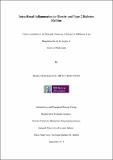| dc.description.abstract | Introduction: Unhealthy diet and sedentary lifestyle, lead to the constellation of obesity, hyperinsulinaemia and hyperlipidaemia that are risk factors for both chronic kidney disease and type 2 Diabetes mellitus. Renal cellular damage in diabetes is associated with expression of pro-inflammatory cytokines and chemokines, which can lead to activation of multiple immunological cell types that may exacerbate glomerular and tubulointerstitial injury. Methods: In a rat model of pre-diabetic obesity, the presence of cellular inflammation and activation of the IL-6/STAT3 inflammatory pathway within the kidney was investigated. In urine cell samples from patients with type 2 diabetes mellitus and non-diabetic patients with severe obesity, the expression of mRNA transcripts for IL-6, IL-6R, IL-17, STAT3 and SOCS3 was quantified and correlated to clinical and laboratory data. In a cohort of type 2 diabetic outpatients, clinical indices from two time points were statistically analysed to investigate the relationships between obesity and parameters of renal function.
Results: Cellular inflammation, specifically increased macrophages, occurred in the glomeruli of young obese rats and correlated with the expression of SOCS3 - a counter-regulatory protein of STAT3 signalling. Macrophages and SOCS3+ cells were increased in glomeruli with higher expression of the damage marker desmin. In contrast to the glomeruli, the interstitial compartment of obese rat kidney had no evidence of cellular inflammation but did have high expression of SOCS3. In human urine cell samples, contrary to expectations, mRNA levels for IL-6 and other pro-inflammatory mediators were similar to healthy adults. However, the ratio between STAT3 and SOCS3 mRNA levels was found to be decreased in diabetic and obese subjects and correlated with body mass index. In a large cohort of type 2 diabetic patients undergoing active medical management, body mass index was found to correlate positively with kidney function and glomerular hyperfiltration was independently associated with obesity. However, further weight gain during follow up was associated with greater risk of declining kidney function.
Conclusions: Obesity is a pro-inflammatory state and has specific harmful effects on the kidney -- primarily the glomerulus. Contrary to some current literature, glomerular inflammation of obesity is not immediately accompanied by tubulointerstitial inflammation -- possibly as a result of high-level expression of counter-regulatory proteins such as SOCS3. In treated type 2 diabetics, obesity is linked to hyperfiltration but is not a potent driver of renal injury during the first decade. However, with time, continued weight gain adversely affects the risk of chronic kidney disease. | en_US |


